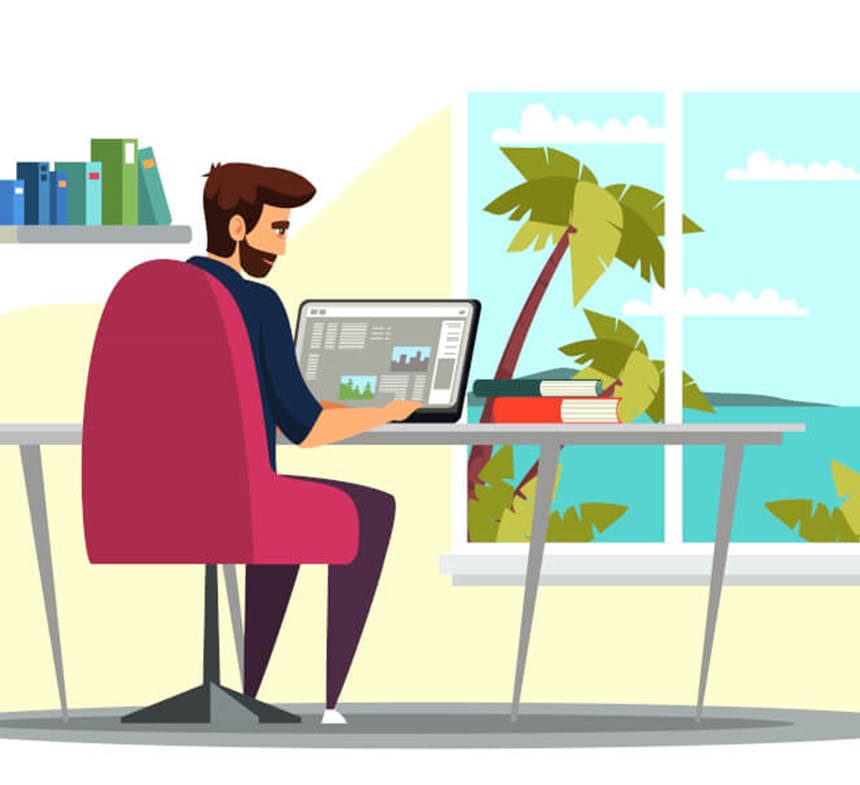So, you’ve decided to take the plunge and work remotely from abroad for a month. Maybe your company has finally embraced the "work-from-anywhere" revolution, or maybe you just need a change of scenery from your usual coffee shop setup. Either way, congratulations! You’re about to embark on a workation—where deadlines meet beachside happy hours.
But before you pack your laptop and book that ticket to Thailand, there are a few things you need to know. Will you still be productive in a place where mango smoothies and beach sunsets call your name? How do you handle the logistics of visas, workspaces, and making sure your boss doesn’t think you’ve disappeared into the jungle? Don’t worry—we’ve got you covered.
Let’s dive into everything you need to know to make your month-long remote work adventure a success.
Visas & Work Permits: Can You Actually Work Here?
If you’re dreaming of working from a beachside coworking space in Pattaya or a trendy café in Chiang Mai, you need to make sure you’re legally allowed to do so.
If your job involves local business—like signing contracts, making sales, or attending meetings on behalf of your company—you may need a business visa. Your employer should help you with this.
If you’re just tapping away on your laptop for a company based elsewhere, the waters get a little murky. Many nomads work on a tourist visa without issue, but technically, it’s a gray area.
For longer stays, digital nomad visas exist in some countries, but Thailand is still developing its own. If you're only staying for a month, your best bet is a 30-day tourist visa (which can sometimes be extended).
Tell Your Employer (or Don’t—Your Call)
Some digital nomads embrace the art of the hush trip—jetting off without telling their employer. Risky? Maybe. But if your company is cool with remote work, it’s better to be upfront.
Things they might want to know:
Data privacy: Can you securely access company files?
Health & safety: If you sprain your ankle while hiking in Chiang Mai, does your company have any responsibility?
Taxes: If your company has a legal presence in the country you’re working from, things can get complicated.
If your trip is more of a “laptop-on-the-beach” situation and you’re not dealing with local clients, your company probably won’t care too much. Just make sure your Slack status doesn’t say “Out of Office” while you’re sipping a coconut.
Pay, Taxes & Insurance—The Boring but Important Bits
Most companies won’t change your salary if you’re away for just a month, but some adjust pay based on location.
Taxes? Unlikely to be an issue unless you stay for several months and start making money locally.
Health insurance? Check if yours covers international travel. If not, get a plan that does.
Travel insurance? Yes, you need it—especially in case of lost luggage, last-minute cancellations, or unexpected hospital visits.
2. Money Matters: How to Avoid Costly Mistakes
Budgeting for a Month Abroad
Thailand is famously affordable, but costs can add up if you’re not careful. Rent, coworking spaces, and those tempting weekend getaways all add up.
Pro tip: Pattaya and Chiang Mai are digital nomad favorites for a reason—great amenities at a fraction of the price of Bangkok or Phuket. A solid budget could look like this:
Accommodation: $500–$1,200 (Airbnb or serviced apartment)
Food: $300 (street food is your wallet’s best friend)
Coworking space: $100–$200
Fun & travel: $500+
Getting Paid & Spending Wisely
Avoid international transaction fees. Digital banks like Wise or Revolut are your friends.
Cash is king. Many places in Thailand still prefer cash over cards. Grab a local SIM card and set up mobile banking (like TrueMoney or Rabbit LINE Pay) to make life easier.
Coworking Spaces vs. Cafés: Where to Set Up Shop
While working at a beach bar sounds great, in reality, sand + laptops = disaster. Instead, check out Thailand’s booming coworking scene.
Pattaya Coworking Spaces: Think high-speed Wi-Fi, air conditioning, and an ocean view to keep you motivated. Plus, great networking opportunities!
Cafés: If you prefer coffee-fueled productivity, Thailand has plenty of laptop-friendly cafés. Just buy a drink every now and then to avoid side-eye from the baristas.
Internet Woes? Stay Prepared.
Get a Thai SIM card with an unlimited data plan (AIS, DTAC, or TrueMove).
Carry a portable Wi-Fi device—just in case.
Be ready for occasional power outages (happens in more remote areas).
Avoiding Burnout in Paradise
One of the hardest things about working abroad? FOMO. It’s tough to sit at your laptop when your new nomad friends are off exploring temples or island hopping.
Solution? Set boundaries and create a schedule:
Mornings: Knock out deep work before distractions hit.
Afternoons: Hit a coworking space or café.
Evenings: Socialize, explore, or relax.
Thailand’s slow-paced lifestyle makes it easy to find balance—just don’t let your workation turn into a vacation.
Meeting People & Networking
Join digital nomad Facebook groups (like Digital Nomads Thailand or Pattaya Coworking & Events).
Attend meetups & coworking events.
Say yes to social invites—you never know who you’ll meet!
Tech Essentials
Laptop + charger
Noise-canceling headphones (coworking spaces can get noisy)
Power bank & universal adapter
VPN (some websites might be blocked)
Clothes & Gear
Thailand is hot, but air-conditioned spaces can get chilly. Pack light, breathable clothes, but throw in a sweater just in case.
Leave Behind:
Too many shoes (flip-flops + one pair of sneakers = perfect)
Heavy jackets (unless you’re headed to the mountains)
Fancy outfits (Thailand is casual—save space for souvenirs instead!)
Absolutely. Working remotely from Thailand offers the perfect mix of productivity and adventure. Whether you're taking Zoom calls from a coworking space in Pattaya or brainstorming ideas while sipping a coconut, a workation can boost your creativity, motivation, and work-life balance.
So, pack your bags, grab your laptop, and get ready for a month of working smarter—not harder—in one of the best digital nomad destinations in the world.
